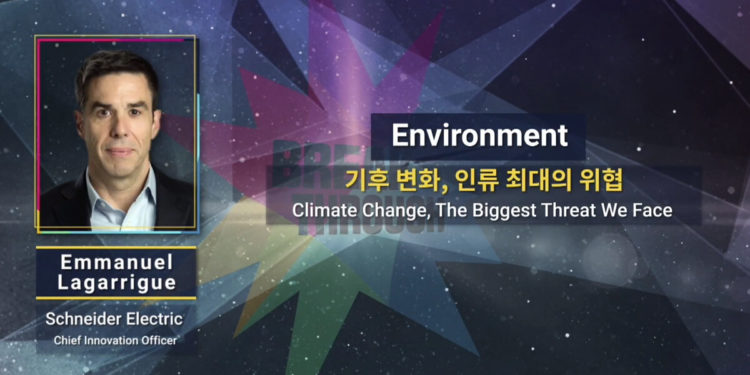The Ministry of SMEs and Startups launched this year’s biggest startup festival in South Korea, the COMEUP 2020, from November 19-21. The three-day event aims to connect startups and business ventures under the theme “Meet the Future – Post Pandemic.”
The afternoon session featured two agenda speeches on behavioral change through digital healthcare and the management of renewable energy to address climate change. Keynote speaker Emmanuel Lagarrigue, Chief Innovation Officer of Schneider Electric, discussed how industries could address climate change through energy revolution and transition to renewable energy.
Environment: Climate Change, The Biggest Threat We Face
The emergence of COVID-19 has accelerated digital transformation and sustainability efforts in South Korea and abroad. As the climate changes and resources getting depleted quickly, the importance of transitioning to renewable energy has exponentially become more significant than ever.

Emmanuel Lagarrigue estimated that by 2050, 50 percent of energy production worldwide would come from solar or wind energy. In 2019, 80 percent of global renewable capacity came from small-scale installation, disrupting, and changing traditional electricity grids.
Energy Revolution would come from decentralized systems leveraging a more digitized infrastructure for consumers to capitalize. Decentralized systems allow people to decide what, when, and how to use energy and storage systems instead of relying on large traditional energy plants. Energy transition creates challenges that would bring high interest in renewables, sustainability commitments by companies, and innovation driving new solutions.
Through the vision “Collaborating for Innovation,” Lagarrigue said that Schneider Electric needs to collaborate with other entities, such as startups, institutions, and universities, to achieve global sustainability.
Energy Revolution
Lagarrigue said that to achieve a more sustainable energy system, Schneider Electric would focus on three main areas:
- Microgrid systems – Schnieder delivers small and large microgrids as an energy-as-a-service. Microgrids would lower prices compared to the more traditional and expansive systems. Smaller systems would also provide a more resilient and reliable distribution of energy.
- Electric vehicle (EV) charging – EV charging includes fleet electrification, installing EV charging hubs for buildings, and commercial and industrial load management and infrastructure.
- Home energy management – Schneider Electric provides simple residential energy management solutions, utilizing solar energy and storage systems. This would give homeowners an active role home energy management, giving them freedom on how to use energy.
Following these systems would make the energy transition to renewable energy consumer-driven, according to Lagarrigue.
Visit COMEUP 2020 website to view the event’s programs. https://www.kcomeup.com/prog/program-main-event.jsp?







